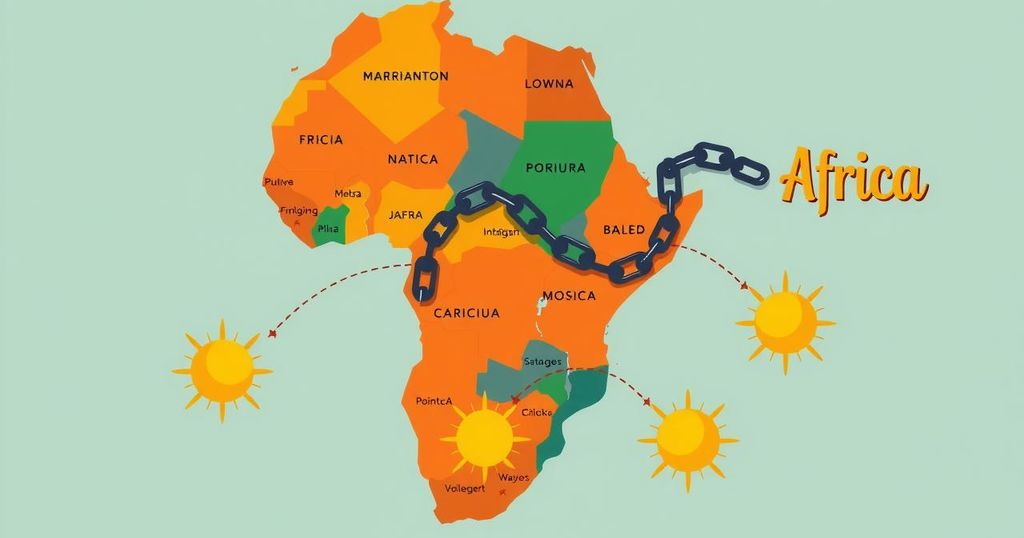World news
AFRICA, ALLIANCE DU CHANGEMENT, ALLIANCE LEPEP, BDP, BOTSWANA DEMOCRATIC PARTY, DEMOCRACY, ELECTIONS, GOVERNANCE, GOVERNMENT, MAURITIUS, MILITANT SOCIALIST MOVEMENT, NAMIBIA, NET, NETUMBO NANDI - NDAITWAH, OPPOSITION, PARLIAMENTARY SEATS, PR, PRAVIND JAGNAUTH, SAHARAN AFRICA, SWAPO
Daniel O'Connor
0 Comments
Namibia’s Swapo Faces Electoral Challenges Amid Regional Political Shifts
Namibia’s governing party Swapo has retained power but suffered significant losses in recent elections. Despite securing 57% of the presidential vote, it faced opposition challenges over electoral irregularities and experienced its worst parliamentary performance. This trend reflects a larger pattern in sub-Saharan Africa where incumbent parties have struggled, largely due to economic downturns and public intolerance of corruption, as evidenced by landslide defeats in Botswana, Mauritius, and Senegal. The resilience of democratic practices suggests a promising future for political shifts in the region.
Namibia’s governing party, Swapo, has experienced a significant electoral setback despite retaining power for over 30 years. Candidate Netumbo Nandi-Ndaitwah won the presidential election with 57% of the votes, becoming the nation’s first female leader. However, the outcome has been contested by opposition parties due to logistical issues and irregularities at the polls. Furthermore, while Swapo increased its presidential vote share, it suffered its worst parliamentary performance, losing 12 seats and barely maintaining its majority.
Swapo’s situation reflects a troubling trend for ruling parties across sub-Saharan Africa in 2024. This year has proven particularly challenging for incumbents, as many have faced significant seat losses or complete power shifts in various elections. Contributing factors include an economic downturn, a rising intolerance towards corruption, and the emergence of more organized opposition parties. This pattern is expected to extend into the upcoming elections in 2025.
Several notable examples underscore this electoral shift. The Botswana Democratic Party, which had ruled since independence in 1966, faced a crushing defeat, dropping to just four seats in parliament. Similarly, the governing party in Mauritius, led by Pravind Jagnauth, won only 27% of the vote, leading to a drastic political transformation. Opposition coalitions have successfully unseated long-standing governments, underscoring a growing trend.
Senegal also witnessed a significant political turnaround when opposition leader Bassirou Diomaye Faye won the presidency, following the release of political prisoners just days before the election. Even in cases where ruling parties retained power, such as South Africa’s African National Congress, their political control and public approval have significantly waned, forcing coalition arrangements that dilute their power.
Various compounding factors have led to these losses. In Botswana, Mauritius, and Senegal, rising public concern surrounding corruption, nepotism, and economic mismanagement has eroded trust in the government. Citizens have expressed frustration over harsh economic conditions, including rising food and fuel prices, propelling protests and opposition activity.
This trend extends beyond Africa, reflecting a global phenomenon. Economic instability, marked by inflation, has impacted governments worldwide, influencing electoral outcomes in countries like the UK and the USA. Notably distinct in Africa, however, is the innovative response from opposition parties who have adapted strategies to protect votes, ensuring transparency and collaborating to present a united front.
Upcoming elections in Ghana and Malawi may further reveal these dynamics. If Ghana’s ruling party experiences a turnover, it would mark an unprecedented five opposition victories in 2024—highlighting a growing resilience of democratic practices in sub-Saharan Africa, despite global democratic declines. This resilience suggests significant potential for democratic revival in the region, as civil society and opposition mobilize to challenge ineffective governance, demanding accountability and change.
International observers and democracy advocates should closely examine this regional shift and its implications for the global political landscape, recognizing that Africa showcases a unique capacity for democratic resurgence despite challenges posed by authoritarian regimes.
In summary, Namibia’s recent elections illustrate broader trends affecting ruling parties across sub-Saharan Africa, characterized by significant electoral losses amid rising public dissatisfaction. The political landscape has shifted dramatically, with many governments experiencing challenges from organized opposition movements. Economic grievances and awareness of corruption have fueled calls for accountability, spotlighting a resilience and willingness among citizens to embrace democratic processes. This regional dynamic suggests a potential for significant electoral shifts in the future, reinforcing the importance of observing African politics with renewed attention.
Original Source: www.bbc.com




Post Comment